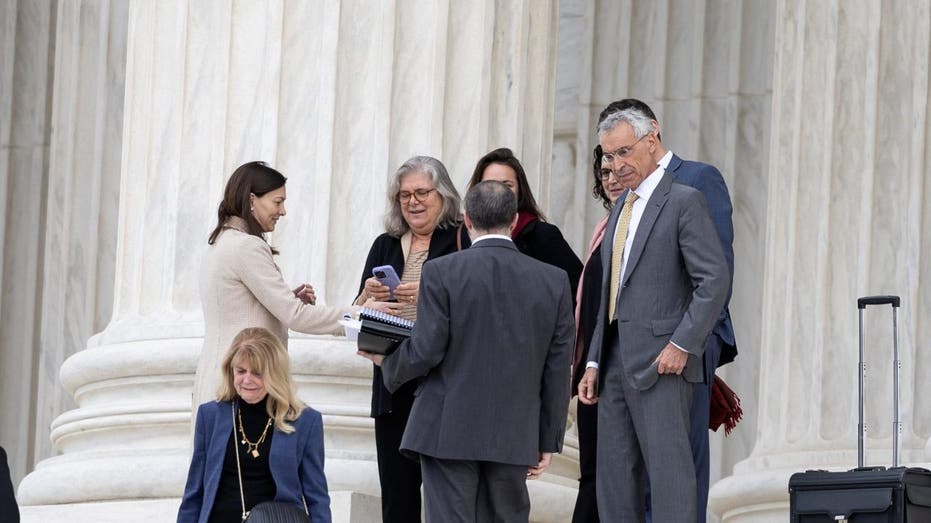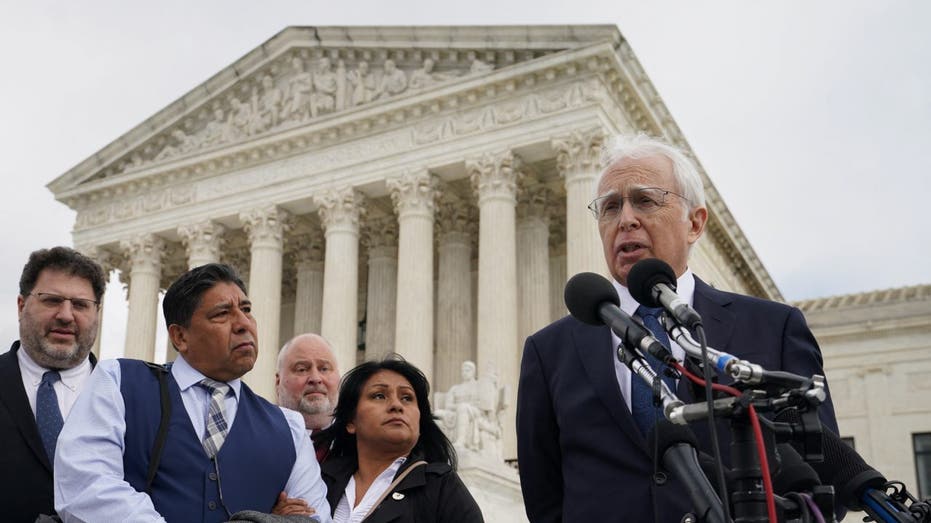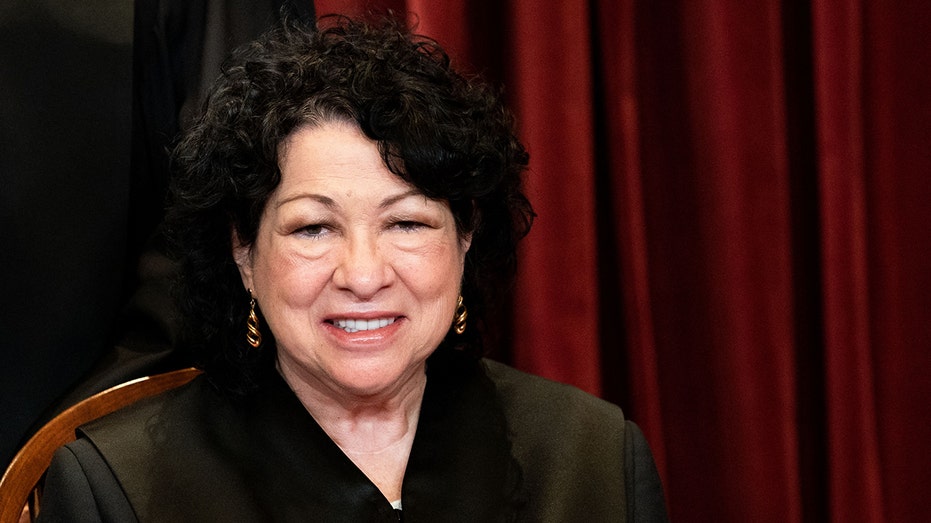Supreme Court hears arguments on whether Twitter Is liable in terror case
Case was brought by family members of man killed in Islamic State attack
These two Supreme Court cases could upend the internet
Former Facebook analyst Kara Frederick weighs in on Twitter, Google comeuppance at Supreme Court after censoring conservatives and says Congress has to act on 'The Evening Edit.'
The Supreme Court heard oral arguments over whether Twitter Inc. and other social-media companies can be sued for allegedly aiding Islamic State, the second in a pair of arguments this week testing the liability of internet providers for user posts.
The case being argued Wednesday, Twitter v. Taamneh, was brought by family members of Nawras Alassaf, who was killed in an Islamic State attack at an Istanbul nightclub in 2017.
The justices questioned Seth Waxman, a lawyer for Twitter, about what conduct by a social-media website would constitute aiding terrorism.

Twitter attorney Seth Waxman, far right, gray suit, exits the U.S. Supreme Court following oral arguments in Gonzalez v. Google, in Washington, U.S., February 22, 2023. REUTERS/Tom Brenner
Mr. Waxman repeatedly said the social-media platform wasn’t used to organize the Istanbul attack, and that Twitter "maintained and regularly enforced policies prohibiting content that promotes terrorist activity."
JUSTICES EXPRESS SKEPTICISM AT HOLDING GOOGLE LIABLE FOR CONTENT
Twitter’s services, Mr. Waxman said, "were exploited by terrorists" in contravention of its policies.
Mr. Alassaf’s family members want to hold Twitter, Facebook parent Meta Platforms Inc. and Alphabet Inc.’s YouTube liable for the attack, saying the companies allowed Islamic State to use their services for general fundraising, recruitment and inciting violence.
The case is similar to the one argued on Tuesday, Gonzalez v. Google, but raises slightly different legal questions. That case was brought by the family of Nohemi Gonzalez, an American college student who was among more than 100 people killed during 2015 terrorist attacks in Paris.

Beatriz Gonzalez and Jose Hernandez, the mother and stepfather of Nohemi Gonzalez who was fatally shot in the 2015 Paris attacks, listen to Attorney Eric Schnapper speak outside the U.S. Supreme Court after justices heard arguments in Gonzalez v. Goo (Reuters Photos)
The focus in Gonzalez v. Google is the law known as Section 230, which has been called the backbone of the internet because it generally protects platforms from liability for content posted by third parties. A lower-court judge cited Section 230 in throwing out that case, so it more squarely presents an opportunity to revisit the foundational internet law, which has come under increased scrutiny in recent years.
SUPREME COURT TO HEAR ARGUMENTS ON GOOGLE AND TWITTER’S LIABILITY FOR TERRORISTS’ ONLINE POSTINGS
Twitter v. Taamneh, on the other hand, hinges on the scope of the Antiterrorism Act and its 2016 amendments, the Justice Against Sponsors of Terrorism Act. Those statutes allow victims of terrorist attacks to seek compensation from sponsors of international terrorism and entities that "aid and abet" terrorism.
A lower-court judge dismissed the case in 2018, saying the plaintiffs couldn’t show that Twitter, Facebook and Google knowingly aided and abetted the Istanbul attack. The U.S. Ninth Circuit Court of Appeals revived the claims in 2021.
| Ticker | Security | Last | Change | Change % |
|---|---|---|---|---|
| META | META PLATFORMS INC. | 661.46 | -8.75 | -1.31% |
| GOOG | ALPHABET INC. | 323.10 | -8.23 | -2.48% |
Lawyers for Google, Twitter and Facebook have said in court filings that they have made extensive efforts to remove Islamic State content and that there is no direct causal link between the websites and the Paris and Istanbul attacks.
Justice Sonia Sotomayor pushed back on that assertion during Wednesday’s argument, questioning whether Twitter had "provided a platform" that Islamic State "used to recruit people and help arrange other terrorist attacks."

Associate Justice Sonia Sotomayor sits during a group photo of the Justices at the Supreme Court in Washington, DC on April 23, 2021. (Photo by Erin Schaff / POOL / AFP) (Photo by ERIN SCHAFF/POOL/AFP via Getty Images) (ERIN SCHAFF/POOL/AFP via Getty Image / Getty Images)
Mr. Waxman responded that Twitter provided routine professional services to the general public, and that isn’t sufficient to create liability.
Mr. Waxman received support during the argument from Edwin Kneedler, a lawyer in the U.S. Solicitor General’s Office, who laid out the U.S. government’s view of the case.
Mr. Kneedler said Twitter, Facebook, and YouTube can’t be held liable for Mr. Alassaf’s death. The platforms never singled out Islamic State for favorable treatment, he said, instead providing the organization with the same services as millions of other users.
"The allegations in this complaint do not state a claim that the defendants aided and abetted—that is, that they assumed a culpable role in the commission of that murder," Mr. Kneedler said.
CLICK HERE TO GET THE FOX BUSINESS APP
Eric Schnapper, a lawyer for Mr. Alassaf’s family, said Twitter should be held liable because of its "willful blindness" toward Islamic State content.
"Our contention is that the policy was to not look at all," said Mr. Schnapper, who also represented the family of a terrorist-attack victim in Tuesday’s arguments in Gonzalez v. Google.
In Tuesday’s argument, Supreme Court justices reacted skeptically to claims that YouTube parent Google LLC could be sued for algorithms that automatically recommended extremist recruiting videos, with Justice Clarence Thomas comparing it to holding a phone company liable for helping someone contact the leader of Islamic State.
Decisions in both cases are expected before July.




















